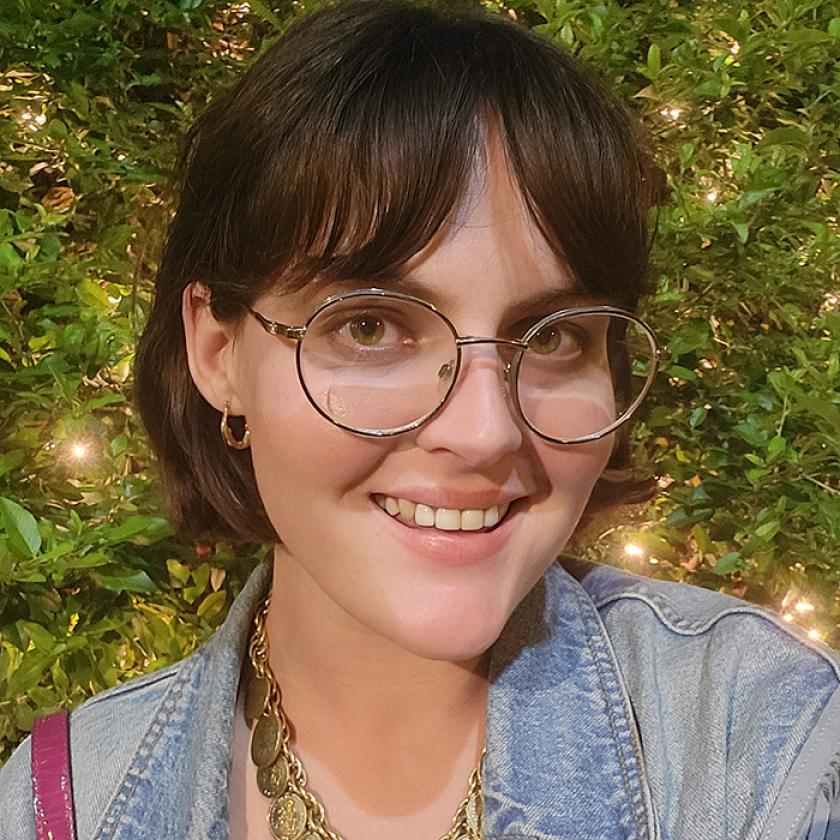
MSLIS student Rachel Riffe discusses her practicum experience at Forge Biologics.
What is your area of interest at the iSchool?
I am primarily interested in biomedical librarianship in either the academic or private sector. I am a graduate assistant in the Funk Library, which is the library for the College of Agricultural, Consumer and Environmental Sciences (ACES); the Departments of Urban and Regional Planning, Landscape Architecture, and Biology; and the Prairie Research Institute. While I enjoy learning about many subjects, life sciences has always been my favorite. As an undergraduate, I found out that I did NOT enjoy doing bench work in a laboratory. The fact that I can contribute to scientific research outside of a lab has been awesome.
Where did you do your practicum, and what was your role?
I worked remotely with Forge Biologics, a gene therapy contract development manufacturing organization based out of Columbus, Ohio. Gene therapy manufacturing is an emerging industry that aims to bring therapies to trial faster by alleviating the production bottleneck the industry has faced in the past decade. Forge's therapeutic branch currently has a Krabbe Disease therapy in phase 1/2 clinical trial, which has shown exciting results!
I was fortunate to experience both the commercial and therapeutic sides of Forge through my work with Senior Manager of Patient Advocacy Michelle Salvo and Senior Director of Commercial Operations Jason Coffey. In my work with Jason, I shuttled account data for the sales teams, updated company profiles, and created quarterly, monthly, and YTD commercial data visualizations.
My work with Michelle was primarily focused on plain-language resource development for families impacted by Krabbe Disease. This included assisting with a website redesign and assessing reader accessibility of print and A/V materials. I also helped lay the groundwork for a patient advocacy intranet, where Michelle can post upcoming events, archive videos, and introduce new employees to the patient advocacy department. Fun fact: During my onboarding session, I was the intern who cried the most during Michelle's advocacy videos. I asked to work with her immediately!
How did you find out about the practicum?
My practicum started as a summer internship. As for how I learned about the opportunity, Forge is a company I had been watching for a while. My decision to pursue a career in biomedical librarianship is fueled, in part, by my love of learning about life science topics, but the real catalyst was being diagnosed with a rare disease. Through conducting my own literature searches, I discovered how much I enjoy digging through journal articles and what impact information professionals can have in the biomedical sphere. Since Forge prioritizes rare disease research and treats its employees well, I knew that the company would be a great place to experience the industry. I reached out to a contact at Forge, who connected me with recruitment, who matched me with some potential departments. It was a lengthy process to get hired, but it was worth it.
What knowledge and skills did you acquire?
I gained experience working with new software and cGMP standards, and I also learned a lot about gene therapy production. Of greater value to me was the insight I gained into what facets of librarianship that I enjoy the most and where they could be used to help support an entity like Forge. My internship inspired me to enroll in courses on information consulting, scholarly communication, and administration and management of information centers.
What did you like best about working at the organization?
I truly adored the work culture and the mission. Since I was involved with both the therapeutics and commercial sides, I got to know each side's unique needs and challenges. It was cool seeing how contracts evolve, learning about the science of gene therapy, and meeting new people from all over. The interns were able to spend time with each member of the C-Suite to ask questions and learn more about the creation of Forge Biologics. COO Jaysson Eicholtz led our tour of the facility. I appreciated the example he set for taking ownership of his work and how the best way to ensure success is to take care of your people and the groups you serve. That was a common theme across the company, and it resonated with me.
What advice do you have for students who are interested in a practicum?
When I was weighing opportunities, I chose to prioritize how closely the company's mission aligned with my passions and whether I would be given the freedom to make the experience my own. Forge was wonderful at tailoring their internship program to their participants. Since I had asked Michelle if I could continue as a fully remote practicum student, it was partially my responsibility to outline what I wanted to get out of the experience. Don't be afraid to tell an organization how you feel you can uniquely contribute.
What are your plans after you complete your degree?
I could see myself becoming either a scientific subject specialist at a research university, a medical librarian for a medical school or hospital setting, or a corporate librarian within biotech. Information skills have broad applications, and my soft skills will be useful wherever I go.